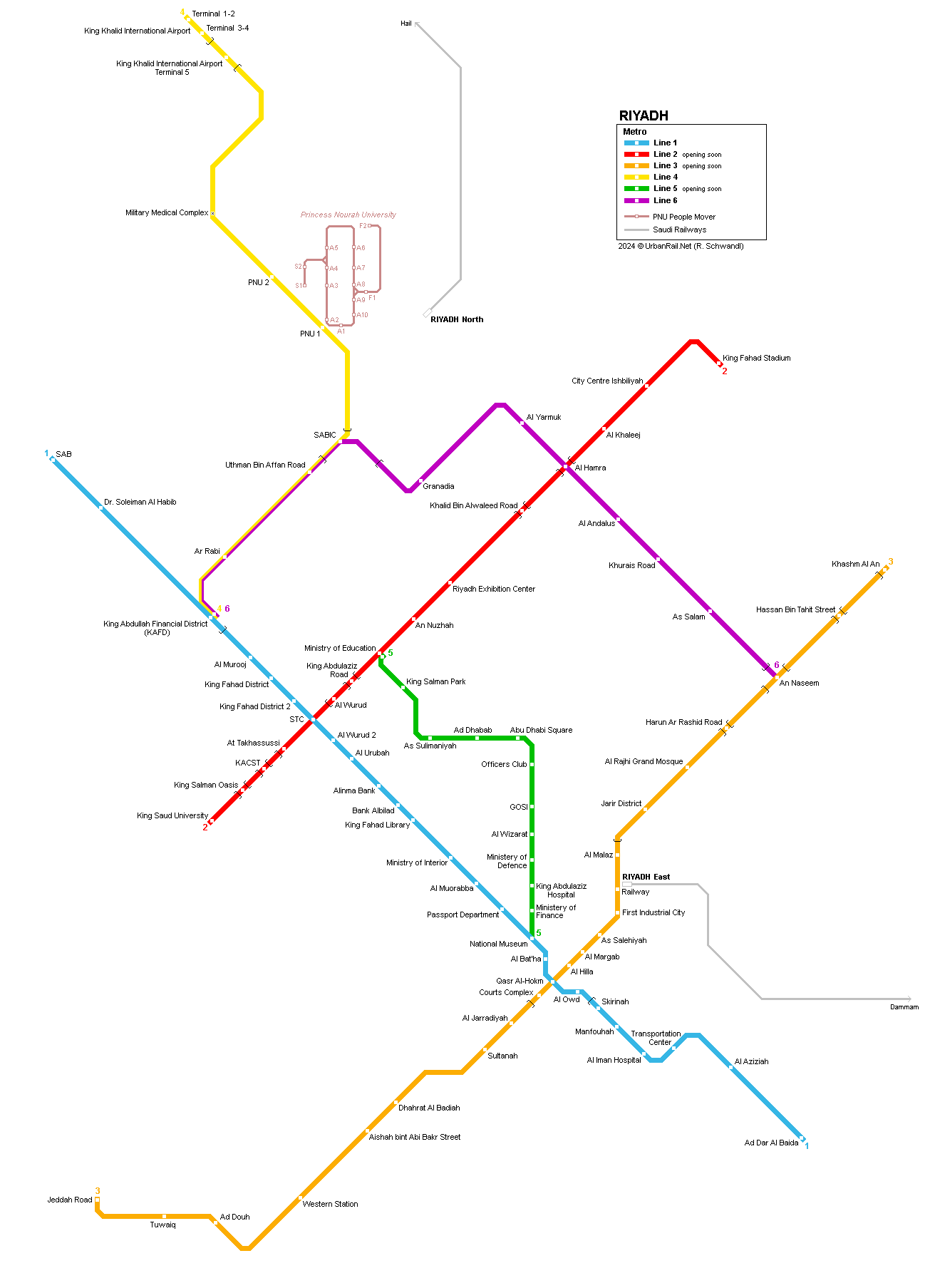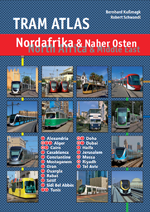
|
[ UrbanRail.Net ] [ Europe ] [ Americas ] [ Asia ] [ Africa ] [ Oceania ] [ News ] [ Books ] [ Links ] |
|
RIYADH
|
| Saudi Arabia |

|
METRO
|
| The Riyadh Metro network comprises six lines totalling 162 km (official sources claim 176 km!) with 85 stations. It was officially inaugurated on 27 November 2024, with regular service starting on 1 December 2024 on the Blue, Yellow & Purple Lines: |
| (1) Blue Line |
|
36.7 km along Al-Olaya – Al-Batha – Al-Hayer roads - opened 1 Dec 2024 (except Ministry of Interior, Qasr Al-Hukm, Sulaiman Al Habib, Al Murooj, Murabba, Wurud 2, Bank Albilad, King Fahad District, King Fahad Library, National Museum, Al Batha, and Al-Aziziyah stations). |
|
|
| (2) Red Line |
|
24.2 km along King Abdullah Road - opened 15 Dec 2024 |
|
|
| (3) Orange Line |
|
39.8 km along Al-Madinah Al-Munawarah Road – Prince Saad Bin Abdurrahman I Road - opened 05 Jan 2025 (initially only serving Jeddah Road, Tuwaiq, Ad Douh, Harun ar Rashid Road and An Naseem stations) |
|
|
| (4) Yellow Line |
|
29.1 km along King Khalid International Airport Road (9 km shared with Purple Line) - opened 1 Dec 2024 |
|
|
| (5) Green Line |
|
12.6 km along King Abdulaziz Road (fully underground) - opened 15 Dec 2024 |
|
|
| (6) Purple Line |
|
28.9 km along Abdurrahman Bin Awf Road – Sheikh Hassan Bin Hussain Bin Ali Road (9 km shared with Yellow Line) - opened 1 Dec 2024 (except An Naseem station) |
|
|
|
|
|
Rolling Stock: The
Metro uses 190 fully automated trains featuring a uniform design: History: 14 Nov 2018: Naming rights for most important stations sold: Riyadh Development Authority (RDA) – previously The High Commission for the Development of Arriyadh - today announced the results of its station Naming Rights auction for the Riyadh Metro network. The Authority has awarded Naming Rights for eight (8) stations to leading commercial organisations from Saudi Arabia and the region, generating a total of SR 1.045 billion (or $ 278.7 million) over the 10-year period of the contracts. Each of the winning bidders – The Saudi British Bank (SABB); Dr. Sulaiman Al Habib Medical Group; Saudi Telecom Company (STC); Alinma Bank; Bank Abilad; Majid Al Futtaim Shopping Malls Company; Granada Investment Center and SABIC – have been awarded with a 10-year contract, which will see their brands featured as the name of a Riyadh Metro station in a naming rights sponsorship deal.
Tunneltalk reports on 29 July 2013: Three international consortia headed by FCC, Spain, Bechtel of the USA and Ansaldo, Italy, are awarded for construction of the 176km Riyadh Metro network in Saudi Arabia (Fig 1). Valued at an estimated US$22.5 billion, the investment covers the largest metro programme under development in the world at present, with procurement of the six-lines and 85-stations grouped into five design-build packages that include supply of the rolling stock and installation of M&E in each. FCC, as leader of the FAST consortium, with partners Samsung (Korea), Alstom (France), Strukton (The Netherlands), Freyssinet Saudi Arabia and engineering companies Typsa (Spain) and Setec (France), is awarded the largest part of the works, to complete a total 64.6km of track and 25 stations for Lines 4 (Orange, towards the airport), 5 (Yellow) and 6 (Purple). Valued at €6.07 billion (about US$8 billion), the contract includes design and construction of an alignment that comprises 26.6km underground, 29.8km on viaducts, and 8.2km at grade. The Blue Line 1 and Green Line 2, linking the Alia–Batha axis and running on the King Abdullah Road axis, is awarded to the BACS consortium. Led by Bechtel and including Vinci (France), Siemens (Germany), Almabani General Contractors (Saudi Arabia), Consolidated Contractors Company (Saudi Arabia), and engineers AECOM (USA), the two lines and their rolling stock are valued at more than US$9 billion - $6.561 billion for the Blue Line and $2.88 billion for the Green Line. The Red Line 3 will run on the Medina Road and Prince Saad Bin Abdulrahman Road axis and is awarded to the Ansaldo-led ANM (Arriyadh New Mobility) group, which includes Bombardier Transportation (UK and Canada), Ansaldobreda (Italy), Larsen & Toubro Construction (India), Salini-Impregilo (Italy), Nesma & Partners (Saudi Arabia) with designers Hyder Consulting (UK), Worley Parsons (USA) and IDOM (Spain). The contract is valued at approximately US$5.211 billion and comprises a 40.7km alignment, 22 stations, installation of electrical and mechanical equipment, and supply of the rolling stock. A fourth group led by Bombardier Transportation (UK and Canada) with OHL (Spain) Al Rajhi Holding Group (Saudi Arabia), YAPI Merkezi Insaat (Turkey), Al Arrab Contracting Co (Saudi Arabia), Shibh AL jazira Contracting Co (Saudi Arabia), GS Engineering and Construction (Korea), with engineers Serco Group (UK), Mott Macdonald (UK) and Parsons Brinckerhoff (Saudi Arabia) prequalified but miss out on the awards. Bombardier Transportation then joined the ANM group. In other group changes, Alpine Bau of Austria, a daughter compay of FCC, pulled out of the FAST group after going into bankruptcy receivership in June, and Strabag of Austria, as the original leader, left the ANM group. Preliminary designs for the near-180km system were carried out by consultants Dar-Al-Hanasah of Lebanon and Egis Rail of France. These base the network on 35.2km of bored running tunnels with a further 13.7km of cut-and-cover work for a total preliminary design subsurface length of nearly 49km. In a statement announcing its success, FCC said it will use three TBMs of about 10m diameter on its three lines and supply a fleet of two-car driverless train sets for the routes to be supplied by consortium partner Alstom. FCC Managing Director Miguel Jurado confirmed to TunnelTalk that the 10m TBMs will build single-tube, double track tunnels. "Supply of the machines is not yet confirmed," he said. He added that all the trains for the system will be of the same design and appearance. As a member of the ANM group, Bombardier confirmed in a statement that it will deliver 47 two-car driverless Bombardier Innovia Metro 300 trains equipped with Bombardier Mitracpropulsion technology. Bombardier's share of the estimated US$5.211 billion contract is valued at about US$383 million. Also appointed in May this year (2013) are the architects and selected designs for the three main intersection stations of the 85 air-conditioned stations on the network, that are planned to be outstanding landmarks of the city's world-class public transport system, providing shopping and dining, and placing the Metro at the heart of city life. The consultancies for the three underground station complexes are Gerber Architekten (Germany) for Olaya Station at the intersection of Metro Lines 1 and 2, Snohetta (Norway) for the Qasr Al Hokm Downtown Station that will serve as a transfer point between Metro Lines 1 and 3, and Zaha Hadid (UK) for the King Abdullah Financial District Station at the intersection of Metro Lines 4 and 6. (© Shani Wallis, TunnelTalk)
Railway Gazette reports on 18 May 2012: Riyadh metro project prequalification begins: Arriyadh Development Authority invited expressions of interest in civil engineering, railway systems and rolling stock contracts for the proposed Riyadh metro on May 15. Responses are to be submitted by June 20. The Saudi cabinet has approved a four-year plan to develop a metro and bus transport network in the capital. The project is being led by Prince Sattam, Governor of Riyadh and Chairman of ADA. One metro line is planned to run 17 km along King Abdullah Road from King Khaled Road in the west to Khaled Ibn Al-Waleed Street in the east, with 11 stations. A second line would run 25 km north-south along Al-Olaya and Al-Batha streets, with 25 stations.
|
| Book |
 B
Bernhard
Kußmagk & Robert Schwandl: B
Bernhard
Kußmagk & Robert Schwandl:
TRAM ATLAS NORDAFRIKA & NAHER OSTEN | North Africa & Middle East 128
pages, approx. 150 colour images April /2025 |
|
Links
|
|
Royal Commission for Riyadh City Riyadh Metro at Wikipedia RATP Dev (Blue & Red Lines) ArRiyadh New Mobility (Orange Line)
|
|
|
2012 © Robert Schwandl (UrbanRail.Net)